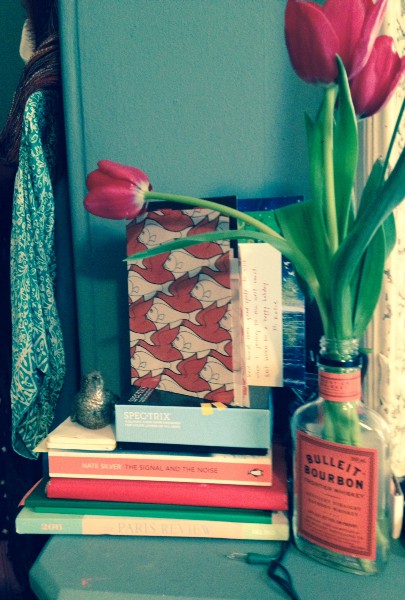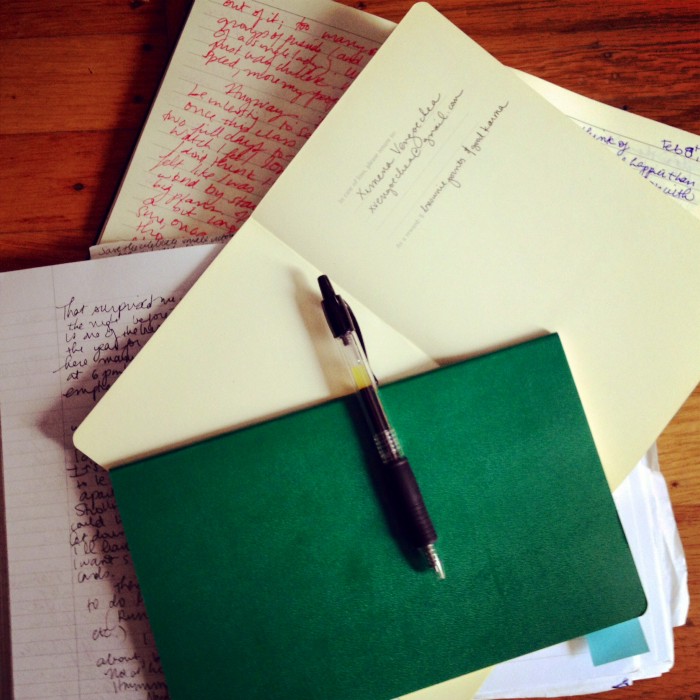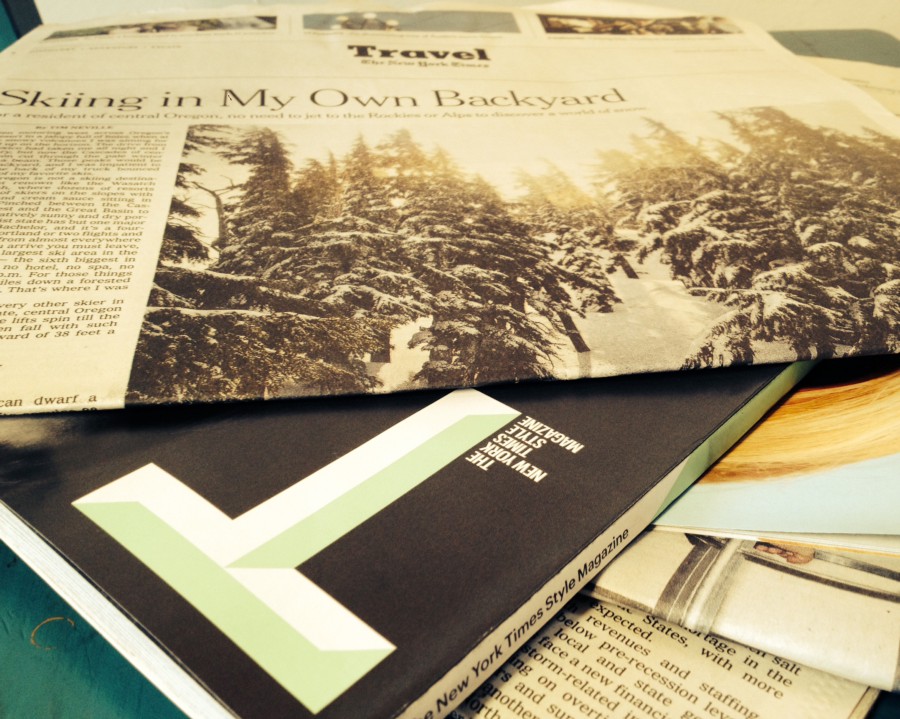This post was originally written by hand.
I like my Internet fast but my reading and writing slow.
I have been writing, but if you follow me online there's no way you could have seen it. In December, as part of my quest to cultivate one habit per month, I journaled every day: quietly, consistently, prolifically. I didn't mean for it to be a secret, but the deeper I got the further I drifted from the Internet. My tumblr went stale. Old articles of mine resurfaced on Medium, but I didn't pick up the conversation. I disengaged from industry conversations I normally would have participated in. I didn't tweet once in three whole weeks. Online, it looked like I didn't exist. (Or perhaps was on vacation.)
To the Internet, Something Was Up! And I confess -- something was up. The truth is, I was writing: I was writing by hand. Writing with ink, pen and paper (not the app). And it felt -- and "felt" is precisely the right word here -- it felt great.
Yes, I am an early adopter that works in tech, but truth be told, I am also a bit of a dinosaur.
I am of the rare breed that still gets the newspaper delivered to the house on Sundays. I buy paperbacks and do not want a Kindle. I think hard copy magazine subscriptions -- not the digital kind -- make great gifts. I have been known to ask my local stationary store to stock up on a particular brand of journals, and never leave the house without one. My back hurts from shuffling around novels and Moleskins and sketchbooks wherever I go, and though I know it would be more practical to store them all in a single slender, slick device, I cannot bring myself to do it.(Even the word "device" is a cold one -- hardly one to cozy up to.) I like my iPad, but it is more of a guilty pleasure than a creative tool for thinking, processing, and reflecting. (Hello, Netflix, fancy seeing you again!) I will always prefer reading books in physical form and building a personal library even though I know it will make my next move that much more difficult.

Books, journals, letters written and sent by hand.
I like these things because they are physical objects -- they are in fact real things that demand my undivided attention.
(But thankfully still require neither feeding nor watering.) They are inconvenient to carry and their functionality is wonderfully limited: I can't swipe or copy/paste or bookmark for later, I can't forward to a friend in a heartbeat. I dog-ear, crease, and scrawl in margins instead; I highlight long passages without looking for a 140 character sound bite to share. Speed-reading is harder, content consumption a little bit slower -- and that is a good thing. Like most over-wired 20-somethings, I am screened-out. I can afford to go slower. I want to go slower.
So when I began my journaling journey, I decided to close my laptop and go it by hand. And that month I discovered a funny, simple thing: writing -- by hand -- makes me a better writer. And reading -- on paper -- that makes me a better reader, too.
I write by hand because it makes me think in ways hammering at a computer never does.

Tools for writing, tools for thinking
No screens mean no notifications to interrupt me, no alerts to bring me back before I've gotten to where I'm meant to go. Instead I watch my thoughts wind and unravel and follow them down the rabbit hole until I land somewhere unexpected, and right. It is the analog version of link-hopping, but unlike online discovery I never feel guilty at the end of a writing session no matter where I end up. I am more patient and less hurried with my thoughts, and so I listen to them more closely. I follow my thoughts without distraction until I don't know where I am anymore; until I am lost in thought, lost in flow. (Of course this doesn't mean every entry is a masterpiece, but it's fascinating to see how far you'll go.)
I think better when I write by hand, and I am more apt to revel in the act then, too.
To write by hand is to indulge in a guilty pleasure: it is a far more satisfying adventure than to tap, tap, tap away at my keyboard.
I spend my free time in coffee shops and the days I leave my laptop at home I feel like a school girl skipping my homework: on the verge of getting into trouble and getting away with something great. How sneaky and gleeful it feels to leave the house with only a journal in my hand! The right pen, the right paper, and oh yes! So that is what my handwriting looks like now.
When I find myself next to patrons pounding furiously at their keyboards, I feel anxiety, not delight. Poor little ASDF's cowering with every thwack! I am stressed by the aggressive, all-too-intense attempts at productivity; I am wary of the nervous energy that comes along with it. And yet I rarely sense anxiety from those scribbling furiously in their journals: theirs is a happy, thorough energy. I wonder if anyone has looked into the effect of writing by hand on endorphins and happiness.
Perhaps unsurprisingly, I recognize that same sense of happy indulgence when it comes to reading screen-free.
It is a far more calming endeavor to read text on paper than to sort through endless tabs of links opened once-upon-a-time in desktop space after desktop space. Likely mixed among bills to pay, emails to respond to, and other life things to address, reading online is hardly a luxurious activity, and hardly unstressful. It is no wonder I rarely get through the tabs I open.
But a newspaper in hand -- this demands my full attention. I am slow to get through the paper, but I cherish in it. I crave news I can touch: news I can feel in my hands, news that stains my fingertips and demands I read with my whole body. I curve my spine and lean forward to squint and study the paper's printed images, I breathe in its inky smell. I tear out articles, I underline, I clip, I crease, I save. I keep my favorite pieces in a physical folder, and a backlog of articles deserving a further look in a pile beside my bed. These may be the same articles open in tab after tab on my computer, but their very physicality asks me to engage in a highly different way. I commit to news that doesn't expire at the refresh of a stream.

Sunday's slow deliveries. Reading off-screen makes me a better reader.
A book, a journal, a newspaper, a thing: they are perfectly stubborn objects that force me to reflect, to slow my thinking, to focus fully and process differently.
I watch the stack of newspapers go down as I pore through section by section before adding my own contributions to the pile. I fill folders and then boxes with articles that resonate with me and which I will someday find reason to revisit. I finish one journal and begin the next, each one a chapter of my life: a summer, a fall, a season of big and small accomplishments made tangible in physical form. Purposeful, deliberate, and like their inspiration, delightfully screen-free: these are remnants of my slow consumption, signs of slow creation.
They are small, but significant: things I can hold in my hands and carry closely, things I can and want to get lost in now and then and over again, things to put away and then return to, to sift through carefully and try to make sense of later. Mostly, these are things that have made me stop and think, not impatiently, but fondly. I put down my notebook and think: that is no small feat.
_____________
Ximena Vengoechea is the Product Operations Manager for mobile products at LinkedIn. Visit her website: ximenavengoechea.com